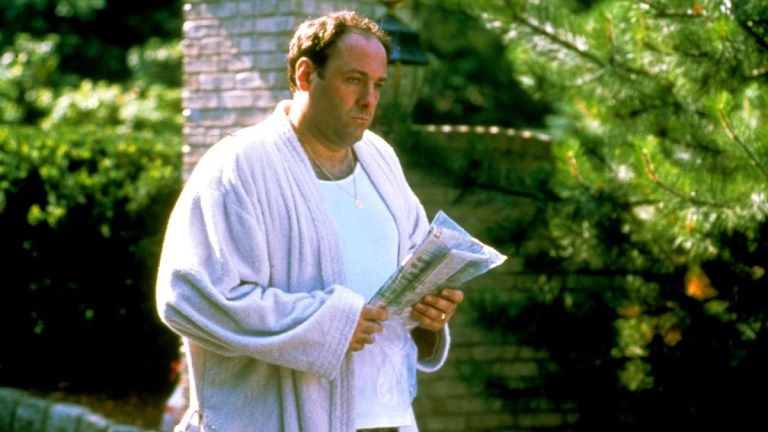How The Sopranos Changed TV Analysis Forever
Rolling Stone chief TV critic and longtime Sopranos expert Alan Sepinwall discusses how the HBO series revolutionized TV journalism.

When The Sopranos first aired over 20 years ago, audiences had never before seen that type of complex storytelling on the small screen. The program was acclaimed for its otherworldly acting and intricate attention to detail, but there were individuals outside of the Sopranos set that helped audiences understand a show that was much more dense and rich than anything that had ever come before it. Without widespread Internet access and with social media not even a mere thought in anybody’s imagination, it was up to pioneering TV analysts to make sense of this new type of prestige television that HBO was letting into our homes.
There is arguably no journalist who has covered The Sopranos in greater depth for the last two decades than Alan Sepinwall. Now Rolling Stone’s chief TV critic, Sepinwall helped shape the narrative of television discourse just as Sopranos creator David Chase forged a revolutionary subject to evaluate. The New Jersey native started his career writing at the Newark Star-Ledger, putting him in an intimate position to cover The Sopranos close to the show’s setting. He went on to write The Sopranos Sessions with Matt Zoller Seitz, a collection of episodic analyses and interviews with show creators that is now viewed as one of the definitive documents covering the series. Due to these resume highlights, his presence covering The Many Saints of Newark is a must heading into the theater to see the film.
Den of Geek spoke with Sepinwall via email for a wide-ranging discussion on his personal ties to the New Jersey area, how TV journalism was shaped by HBO’s megahit and vice versa, and how the analysis landscape has evolved in the last 20 years.
You famously got your start writing for the same paper Tony Soprano picked up from his driveway each morning on The Sopranos. How much did this personal connection to the Jersey universe in the show affect your career trajectory and do you think you would have become the same type of critic without these ties?
Oh, I was incredibly lucky. Right place, right time. It’s a bit like being the music writer for the Liverpool Daily Post when The Beatles started playing at the Cavern Club in 1962. Not only did the show reach out to The Star-Ledger for help designing those fake newspapers, but one of my editors had gone to Rutgers with Jim Gandolfini, and I grew up one town over (and a few decades later) from David Chase. So there were all these connections that gave me better access and a broader base of knowledge. And then the morning after the show ended, David liked and trusted me enough to very reluctantly give me the only interview he gave about the finale for a long, long time. The show put me on the map, and my focus on it over those later seasons made me a better critic.
We’ve always wondered how you are able to separate what your favorite shows are from what you think the best shows are. Is it hard to not show bias towards The Sopranos in your writing because of your longstanding history with it?
I’ve criticized plenty of episodes of the show, and even whole seasons at times. (Though revisiting the show when I co-wrote The Sopranos Sessions made me look more fondly on, say, season four.) I think there’s a degree to which I know the show so well at this point that I probably look at it differently from more casual viewers, but I’ve never felt in the tank for it.
Do you think David Chase waited too long to make The Many Saints of Newark? There is a good amount of interest in the film, but could there have been more if it was made more recently after the series finale?
I think the movie is actually coming along at a very good time. Sopranos had a huge moment during the pandemic when it seemed like everyone was using the quarantine as an excuse to either watch the show for the first time or rewatch it for the first time in years. A whole new generation discovered the show and will appreciate Many Saints in a way they wouldn’t have if the movie had come, say, 5 or 6 years ago. And also, it allowed Michael Gandolfini to mature into an actor capable of playing the young Tony as well as he does in the film.
Do you think Tony Soprano’s template for anti-heroes was ultimately a good thing for society at large? Bad men being depicted as badasses on TV was almost too abundant in the years after The Sopranos, but did the ones who actually got it right pay off at large in your opinion?
I think there is definitely a degree to which our lauding of bad guys like Tony or Walter White helped make more recent political developments possible. Sopranos and the shows it inspired encouraged people to root for assholes provided they were interesting or charismatic enough.
Do you think The Sopranos, in general, has aged well? Do you think it has been surpassed in any way by more modern storytelling, or are the elements that made it special in 1999 still going as strong as ever? Will the film prove in any way that this universe is timeless?
When Matt Seitz and I started working on The Sopranos Sessions, I was terrified that the show would feel dated, and/or like an inferior copy of the many series that copied it over the last two decades. Instead, the opposite happened. Not only did the show hold up, but I wound up enjoying a lot of it even more than I did the first time around. (Again, see season four.) My appreciation for Jim Gandolfini in particular went way up, to where I stopped considering him on the same level with Bryan Cranston, Ian McShane, et al, and felt comfortable saying he was head and shoulders above any other dramatic performance in TV history. Sopranos was so far ahead of the curve, and so many of its imitators only copied the superficial aspects of it, that when you get exposed to the real deal, it’s still incredible.
What has been the biggest difference you’ve noticed in your readers’ reception to your Many Saints of Newark writing compared to your Sopranos stuff back in the day? Have audiences grown more intelligent through the years which allows you to dive deeper in your analysis, or is the market oversaturated now which makes it harder for striking criticism to stand out?
The big difference so far is that the movie’s not out yet. Over time, The Sopranos became a show where my most notable writing appeared after individual episodes were available. I’m planning to do something similar about Many Saints when it comes out. But audiences are definitely expecting deeper analysis of television — or, in this case, of films based on TV shows — than what the media was doing when Sopranos debuted.
The Sopranos was a landmark series for countless reasons, with one of the more important ones being that the depth of the material allowed for TV criticism to really capitalize on its unique qualities and expand exponentially as a medium. But perhaps journalists like yourself don’t get enough credit in making audiences understand that what they were watching was important. How bidirectional was the relationship between the show’s popularity and the analysis of it?
Over the years, the best compliment my writing has gotten has been when someone tells me they didn’t fully appreciate everything a show or episode was doing until they read my take on it. I think shows like Sopranos or Breaking Bad or The Wire are so obviously great that they don’t need analysis from me or anyone else. But I feel like the explosion in TV criticism inspired by shows like them wound up enhancing the experience for viewers who wanted to dig deeper than what they got from watching alone.
What is the biggest difference you have noticed in your job requirements between covering shows for Rolling Stone now and reporting on them back in New Jersey for the Star-Ledger? Has covering The Many Saints of Newark brought back nostalgia for earlier in your career?
Leaving aside the very seismic economic changes to the media business in general, the biggest difference is expectations. People want more coverage, and they want it to be more in-depth and thoughtful than what was happening at the start of my career in the mid-’90s. The very idea of writing about shows and movies for people to read after they watched felt largely alien back then. Now it’s a huge part of how people cover and consume media.
It was also really exciting and surprising to be back in Sopranos country again after so long. (David) Chase is always a fascinating — if challenging — interview subject, and I got to do the kind of in-depth interview with Michael Gandolfini that I never got the chance to with his press-shy dad. It’s been wonderful.
Do people go to you for Sopranos stuff in ways that they wouldn’t for other reporters in the industry? Has this helped you career-wise, like when you get to do big features for Rolling Stone for the Many Saints of Newark? Do cast and creators on the show view you as an authority on the show the way readers do?
Rolling Stone has a fantastic group of movie writers, but they asked me to handle a lot of their Many Saints coverage. And I’ve been happy to function as a human Sopranos Wiki for friends and fellow critics who have been boning up on the show to prep for the movie. There were even a few times conducting interviews with the Many Saints creative team where someone like (director) Alan Taylor would joke that I knew parts of the show better than they did. As areas of expertise go, it’s not a bad one to have.
Who is your favorite person from the show to interview throughout the years? Do you have a favorite interview you have done with someone from The Sopranos universe?
The Michael Gandolfini profile I did for Rolling Stone is one of my favorite things I’ve ever written in my whole career. But Chase is the best interview, in part because he’s so tough that it forces me to sharpen every question to a razor point, in part because he has just thought so deeply about every aspect of the show, and now of the movie. I always feel like I’ve gone ten rounds in the ring with David, but it always feels worth the effort.
